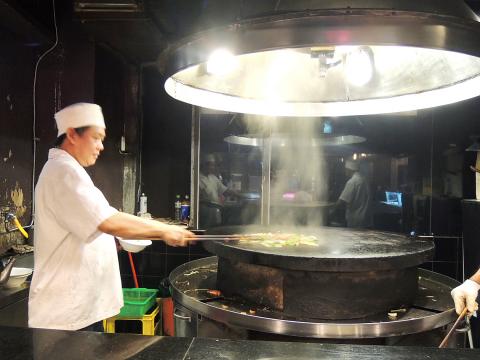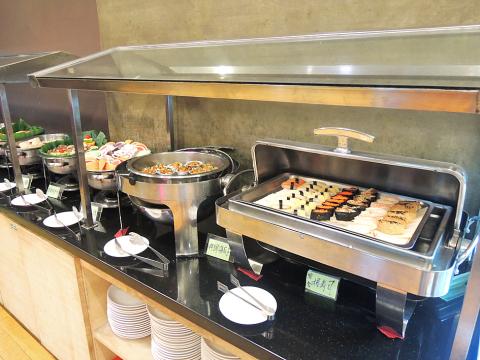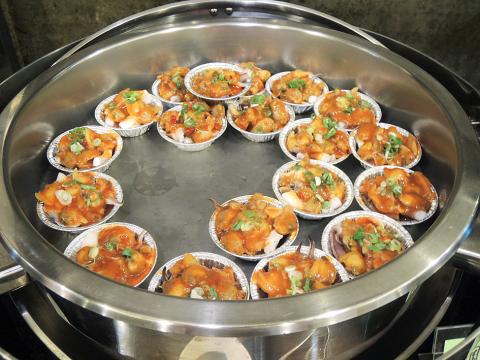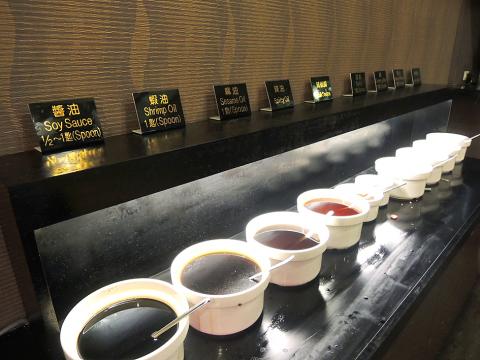Mongolian barbecue is not really Mongolian cuisine, and Genghis Khan of the Mongol Empire probably never had it while trying to conquer the world. And it has little to do with barbecue. The dish was developed in Taiwanese restaurants more than half a century ago, and the term was coined by legendary crosstalk performer Wu Zhao-nan (吳兆南) in 1951 when he opened a barbecue eatery in Taipei.
Established in the 1960s, Genghis Khan Mongolian Bar-B-Q is the oldest restaurant that specializes in the stir-fried dish today. It is about a 10-minute walk from Zhongshan MRT Station (中山站). The first floor of the two-story restaurant is closed during weekdays, so my family and I were seated at two round tables on the second floor for dinner.
At Genghis Khan, you first choose ingredients from a display of meats, vegetables and sauces to create your own bowl. You then hand it to a chef, who cooks it in front of you on a giant circular iron griddle. The restaurant provides four varieties of meat: beef, pork, lamb and chicken. They are thinly sliced and neatly piled in four containers on a counter. It also offers nine varieties of vegetables: basil, bean sprouts, cabbage, carrots, onions and green onions, pineapples, tomatoes and water spinach.

Photo: Eddy Chang, Taipei Times
I had some beef and lamb, and a little bit of everything from the vegetable counter, so my creation looked colorful. It is said that an enzyme in pineapple can tenderize meat, so I added a few slices to my bowl.
Next, I moved to the counter where various sauces were displayed. All the labels for the sauces are written in Chinese and English, with suggested amounts for each. A chef told me that soy-bean sauce, shrimp oil, sesame oil and rice wine were the most commonly used, so I took one teaspoon of each and added some garlic and chilies just to spice things up.
Finally, I handed my bowl to one of the two chefs at the semi-open kitchen next to the sauce counter. The chef skillfully stirred all the ingredients on the griddle and added some water to ease cooking. The sizzling sound and tempting smell immediately aroused my appetite. The chef said that the temperature of the griddle could be as high as 800 degrees Celsius, so they moved fast during the cooking process.

Photo: Eddy Chang, Taipei Times
Within a minute, my Mongolian barbecue was ready. The quickly stir-fried beef and lamb were quite tender with a robust meat flavor. Since the chef added some water during the stir-frying, the vegetables did not dry out. But I realized that I added too much soy sauce because my barbecue was a little too salty. A traditional way of eating Mongolian barbecue is putting it in a baked sesame seed coated cake. My cake was crispy and flavorful.
Apart from the Mongolian barbecue, additional buffet items were available, including a mini salad bar, a good selection of appetizers and seven dishes. My favorite appetizer was mixed meat jelly; the mix and chilled jelly-like broth were a good match. Other dishes on the night we dined included a nigiri sushi combo (綜合握壽司), seasoned Venus clams (特調海瓜子), boiled neritic squid (美味軟絲), sea bream with teriyaki sauce (照燒鯛魚排), free-range chicken with green onion oil (油蔥土雞), boiling water scalded shrimps (白灼鮮蝦) and abalone salad (鮑魚沙律). All the seafood dishes were fresh and well cooked. Genghis Khan also has a variety of drinks, desserts and fruit to finish off the meal — though the former two weren’t anything to write home about.
There are three prices for the dinner buffet: NT$520 for an adult, NT$270 for a child (between 110cm and 140cm tall) and NT$120 for a young child (below 110cm), along with a 10-percent service charge. For lunch buffet during weekdays, it is only NT$420 for an adult. Overall, Genghis Khan was an enjoyable dining experience, and its authentic Taiwanese-style Mongolian barbecue deserves a try.

Photo: Eddy Chang, Taipei Times

Photo: Eddy Chang, Taipei Times

The 2018 nine-in-one local elections were a wild ride that no one saw coming. Entering that year, the Chinese Nationalist Party (KMT) was demoralized and in disarray — and fearing an existential crisis. By the end of the year, the party was riding high and swept most of the country in a landslide, including toppling the Democratic Progressive Party (DPP) in their Kaohsiung stronghold. Could something like that happen again on the DPP side in this year’s nine-in-one elections? The short answer is not exactly; the conditions were very specific. However, it does illustrate how swiftly every assumption early in an

Francis William White, an Englishman who late in the 1860s served as Commissioner of the Imperial Customs Service in Tainan, published the tale of a jaunt he took one winter in 1868: A visit to the interior of south Formosa (1870). White’s journey took him into the mountains, where he mused on the difficult terrain and the ease with which his little group could be ambushed in the crags and dense vegetation. At one point he stays at the house of a local near a stream on the border of indigenous territory: “Their matchlocks, which were kept in excellent order,

Jan. 19 to Jan. 25 In 1933, an all-star team of musicians and lyricists began shaping a new sound. The person who brought them together was Chen Chun-yu (陳君玉), head of Columbia Records’ arts department. Tasked with creating Taiwanese “pop music,” they released hit after hit that year, with Chen contributing lyrics to several of the songs himself. Many figures from that group, including composer Teng Yu-hsien (鄧雨賢), vocalist Chun-chun (純純, Sun-sun in Taiwanese) and lyricist Lee Lin-chiu (李臨秋) remain well-known today, particularly for the famous classic Longing for the Spring Breeze (望春風). Chen, however, is not a name

There is no question that Tyrannosaurus rex got big. In fact, this fearsome dinosaur may have been Earth’s most massive land predator of all time. But the question of how quickly T. rex achieved its maximum size has been a matter of debate. A new study examining bone tissue microstructure in the leg bones of 17 fossil specimens concludes that Tyrannosaurus took about 40 years to reach its maximum size of roughly 8 tons, some 15 years more than previously estimated. As part of the study, the researchers identified previously unknown growth marks in these bones that could be seen only